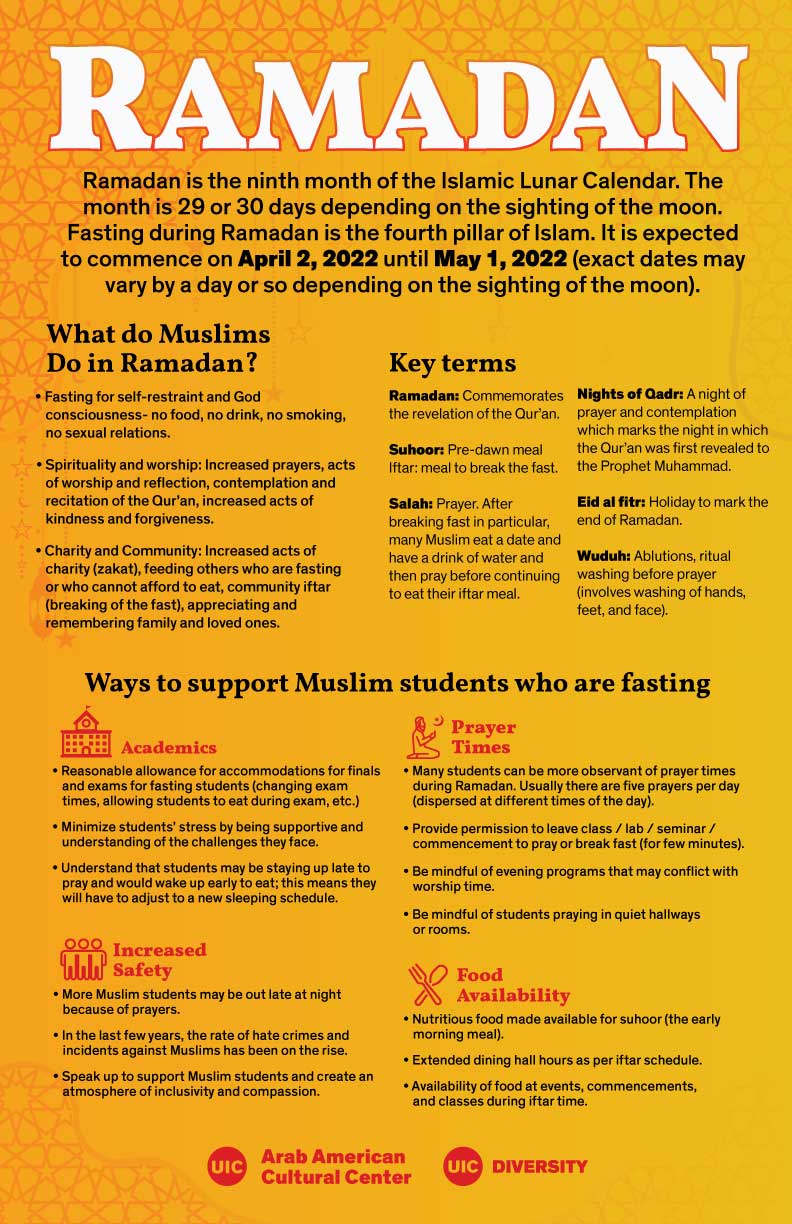April Marks Ramadan and Arab American Heritage Month at UIC

Ramadan and Arab American Heritage Month both fall during the month of April this year and, in anticipation, the Arab American Cultural Center has released a guide and series of resources for learning about the Islamic holiday and helping to support students and campus members who are observing it.
Ramadan is the ninth month of the Islamic Lunar Calendar and commemorates the revelation of the Qu’ran to the Prophet Muhammad. It runs for 29 or 30 days, depending on the sighting of the moon, and occurs during the spring months (although the exact dates differ from year to year based on the moon cycles). In 2022, it is expected to commence on/around April 2 and end on/around May 1.
Fasting during Ramadan is the fourth pillar of Islam and is practiced from dawn to sunset. General abstinence from smoking and sexual activity is also observed, and extra time is devoted to spirituality, worship, charity, and community. As such, there are several ways in which non-Muslim campus members can accommodate and support observant Muslims.
The Arab American Cultural Center recommends the following considerations: “Fasting Muslim students are likely to be especially stressed and anxious as COVID-19 may prevent them from fulfilling important components of this holy month, like praying in the mosque, volunteering their services, and spending time with family and friends. Consider giving students options or accommodations for exams that take place in the afternoon or at dusk. As well as providing a short break for students to eat or drink or articulate to them that they can eat while attending class online, especially when classes are at iftar [a meal taken at sundown to break the daily fast] meal-time.”
The interdisciplinary Symposium on Women, Gender, and Sexuality in the Middle East and North Africa will also be held on April 5 from 9:30AM – 5PM at the Jane Addams Hull-House Museum and will engage with students, faculty, and staff from East and West campus as well as community partners via roundtables, presentations, and conversations exploring gender, sexuality, and women’s activism across the Middle East and North Africa (MENA) regions and diasporas.
The keynote presentation–Who Cares? Studying Women, Gender, and Sexuality in the Middle East and North Africa–will be given by Dr. Suad Joseph, Distinguished Professor at the University of California, Davis who is a leading figure in the field of anthropology and women’s studies of the Middle East and North Africa.
This event is sponsored by the College of Nursing, Institute for Humanities, Gender and Women’s Studies, Middle East and Muslim Societies Cluster, Global Asian Studies, Women’s Leadership and Resource Center, Gender and Sexuality Center, Office of International Affairs, Jane Adams Hull-House Museum, Arab American Cultural Center, French and Francophone Studies, and Honors College.